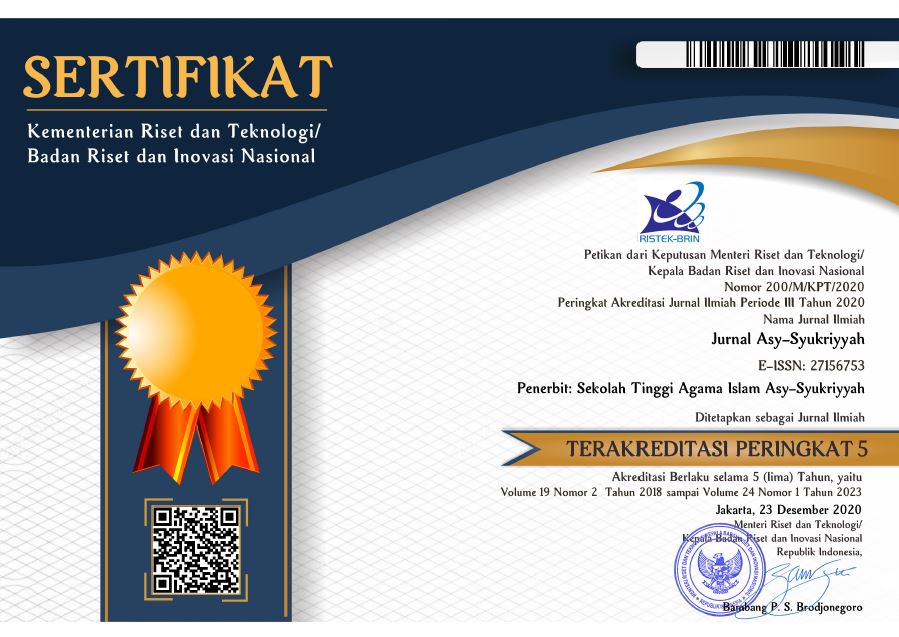PEMAHAMAN ISLAMIC ENTREPRENEURSHIP VALUES SEBAGAI MOTIVASI MEMBANGKITKAN USAHA PASCA PANDEMI COVID-19
(OVERVIEW SURAT QURAISY)
DOI:
https://doi.org/10.36769/asy.v24i1.314Keywords:
Islamic Entrepreneurship, Post Pandemic, Surat QuraisyAbstract
Understanding Islamic entrepreneurship is very important to build a community entrepreneurial spirit that is oriented towards worldly and spiritual benefits. Then Islamic principles should be realized, so that entrepreneurship becomes an interesting topic of study that can minimize life's problems, especially economic problems. Through a study with a qualitative approach, this study aims to describe understanding of Islamic entrepreneurship as an attempt to arouse the spirit of entrepreneurship, especially after the Covid-19 pandemic through an overview of the surat Quraisy. The method used in this research is library research or literature review, which collects data from the literature and other sources that support and are related to the discussion in this study. The results of the discussion in this study entrepreneurship is an ideal alternative to the economic crisis, especially after the Covid-19 pandemic, where many businesses have experienced a decline. Islam makes entrepreneurship part of worship, therefore it is important to understand Islamic entrepreneurship in a Muslim so that it is able to bring prosperity to the poor and is worth blessing according to the directions in the surat Quraisy. This research is limited to a qualitative approach through literature review which can be redeveloped with another approach using data analysis methods in case studies, considering the many contemporary economic cases that can be used as research material.
References
Al-Qurthubi. 2003. Al-Jami’ li Ahkam Al-Quran. Riyadh: Dar’Alam Al-Kutub.20.204
Amadea, P,T & Riana, G,I. 2020. Pengaruh Motivasi Berwirausaha, Pengendalian Diri, dan Lingkungan Keluarga Terhadap Niat Berwirausaha. Ejmunud. 3 (1).
Aprijon. (2013). Kewirausahaan dan Pandangan Islam. Menara Riau; Jurnal Ilmu Pengetahuan Dan Pengembangan Masyarakat Islam.12(1).1–11
Asosiasi Fintech Pendanaan, AFPI. 2020. Fintech Indonesia. Data Industri 2020.
Az-Zuhaili. 1998. Tafsir Al-Munir Fil Al-‘Aqidah wa Al-syari’ah wa Al-Manhaj. Bairut: Dar Al-Fikri. 30.415
Butar-butar, M. 2021. Penguatan Entrepreneurship Insight Guna Meningkatkan Daya Saing Bagi Pelaku UKM di Kota Pematangsiantar. Jurnal Pengabdian Masyarakat. 1 (1). 9-16
Darwis, M. (2016). Pendidikan Entrepreneurship Dalam Perspektif Global. Tarbiyatuna: Jurnal Pendidikan Islam. 9(2).112–128.
Hamdan, H. (2019). Model Pengembangan Kreativitas dan Inovasi dalam Membentuk Entrepreneur di Era Ekonomi Digital. Jurnal Manajemen Dan Kewirausahaan, 7(1), 59–68. https://doi.org/10.26905/jmdk.v7i1.2548
Hilyati, M. (2013). Pendidikan Kewirausahaan; Sebuah Alternatif Mengurangi Pengangguran Terdidik dan Pencegahan Korupsi. Al-Ta’lim Journal, 20(3), 465–471. https://doi.org/DOI: https://doi.org/10.15548/jt.v20i3.44
Ibnu Katsir.1999. Tafsir Al-Quran al-‘Azim. Dar Thaybah li Al-Nasyr wa Al-Tauzi. 8.491
Isa Muhammad Adamu. 2011. Sprituality in Entrepreneurship from Islamic Perspective: Conceptual Analysis on the Effects on Entrepreneurial Motivation and Social Responsibility. International Conference of the Academy of HRD (Asia Chapter)
Kementrian Keungan Republik Indonesia. 2020. Siaran Pers/27/KLI/2020.
Kementrian Koordinator Bidang Perekonomian. 2022. Biro KLIP Kemenko Perekonomian.
Lee, T., & Chu, W. (2011). Entrepreneurial Orientation and Competitive Advantage: The Mediation of Resource Value And Rareness. African Journal of Business Management, 5(33), 12797– 12809. https://doi.org/10.5897/AJBM11.1179
Mulyadi, M. 2011. Penelitian kualitatif dan kuantitatif serta Pemikiran Dasar. Jurnal Komunkasi dan Media Massa. 15(1). 131.
Nuranisa. (2018). Sistem Kewirausahaan Islam. IQRA : Jurnal Ilmu Kependidikan & Keislaman.2(1). 45–52.
Nurfaqih, M. I., & Fahmi, R. A. (2018). Social Entrepreneurship (Kewirausahaan Sosial) dalam Perspektif Ekonomi Islam. Working Paper Keuangan Publik Islam, 1(8), 1–15.
Siswanto, A. (2016). The Power of Islamic Entrepreneurship: Energi Kewirausahaan Islami. Jakarta: Amzah
Subur. (2007). Islam dan Mental Kewirausahaan; Studi Tentang Konsep dan Pendidikannya. Insania; Jurnal Pemikiran Alternatif Kependidikan, 12(3), 341–354. https://doi.org/DOI: https://doi.org/10.24090/insania. v12i3.258
Utomo, K.W, dkk. 2021. Islamic Entrepreneurship. Konsep Berwirausaha Ilahiyah. Jakarta: Edu Pustaka.
Venesaar, U., Kolbre, E. & Piliste, T. 2016. Students’ attitudes and intentions toward entrepreneurship at Tallinn University of Technology. TUTWPE, 154(1), 97–114.
Wahid, A.A. 2010. Tafsir Ekonomi Kontemporer Kajian Tafsir Al-Quran tentang Ekonomi Islam. Jakarta: Madani Publishing House.
Yuliana, E. (2017). Kewirausahaan dalam Perspektif Islam. Ta’dib, 15(2), 29–44. https://doi.org/DOI: https://doi.org/10.37216/tadib.v15i2.183
Zed, M. 2008. Metode penelitian kepustakaan, Jakarta: Yayasan Obor Indonesia.
Fauzan, F., & Nuryana, I. (2014). Pengaruh Penerapan Etika Bisnis Terhadap Kepuasan Pelanggan Warung Bebek H. Slamet Di Kota Malang. Jurnal Ekonomi MODERNISASI, 10(1), 38
Misbahuddin, J. (2011). Konsep Al-Islam Dalam Al-Qur’an. Jurnal Al- Ulum, 11(2), 283–310.
Downloads
Published
How to Cite
Issue
Section
License
Copyright (c) 2023 Nur Majdina Dina, Engga Jalaludin

This work is licensed under a Creative Commons Attribution 4.0 International License.















